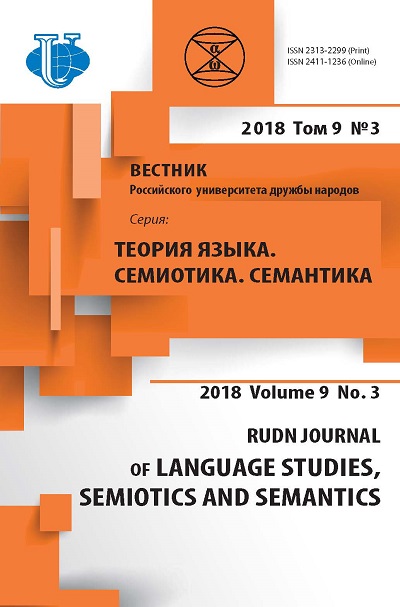HONORIFIC TITLES IN BRITISH ENGLISH AND AMERICAN ENGLISH
- Authors: Yuryeva J.B1
-
Affiliations:
- RUDN University
- Issue: Vol 9, No 3 (2018)
- Pages: 685-695
- Section: SCIENCE 21.0
- URL: https://journals.rudn.ru/semiotics-semantics/article/view/19433
- DOI: https://doi.org/10.22363/2313-2299-2018-9-3-685-695
- ID: 19433
Cite item
Full Text
Abstract
Our modern, globalized world is developing along the path expanding the cooperation in economic, political, social and cultural life. The result of this interaction is the rapid growth of cultural exchanges and direct contacts between state institutions, social groups and individuals of different countries and cultures. The interrelation of language and culture plays an important role in communication both between the members of one group and with the representatives of other cultures. English is a global language and the term “English as an International Language” (EIL) corresponds to British English (BrE), American English (AmE), Canadian English (CanE), and Australian English (AusE). The present paper aims at showing differences between the usage of honorific titles in two varieties of the English language - American and British - relating to address forms used in everyday interaction and explaining the differences through social and interpersonal relations, cultural values and politeness strategies. The recent study of address forms is relevant as it helps us to find out speaker’s cultural peculiarities and to determine different usage of honorific titles in AmE and BrE. We draw on G. Hofstede’s Cultural dimensions (1991), Politeness theory (Brown and Levinson 1987, Hickey and Stewart 2005, Leech 2014), Intercultural pragmatics (Kecskes 2014, Wierzbicka 1991/2003). The data has been obtained through observation, questionnaires and interviews which contained a number of questions and situations, covering different social contexts: everyday communication with interlocutors of different age, sex and occupation. The study focuses on the main tendencies which illustrate the impact of culture on the usage of honorific titles in American English and British English.
About the authors
Julia B Yuryeva
RUDN University
Author for correspondence.
Email: yureveyb@gmail.com
PhD student of the department of foreign languages, RUDN University; academic interests: comparative linguistics, pragmatics, discourse analysis, methods of teaching foreign languages
6, Miklukho-Maklaya Str., Moscow, Russia, 117198References
- Larina, T. (2015). Culture-Specific Communicative Styles as a Framework for Interpreting Linguistic and Cultural Idiosyncrasies. International Review of Pragmatics, 7(5). Special Issue: Communicative Styles and Genres, 195-215.
- Hofstede, G.H. (1991). Cultures and Organizations: Software of the mind. McGraw-Hill Book Company (UK) Limited. London.
- Brown, P. & Levinson, S. (1987). Politeness: Some Universals in Language Usage. Cambridge: Cambridge University Press.
- Hickey, L. & Stewart, M. (2005). Politeness in Europe. England: Multilingual Matters.
- Leech, G. (2014). The pragmatics of politeness. Oxford: Oxford University Press.
- Kecskes, I. (2014). Intercultural Pragmatics. OUP USA.
- Wierzbicka, A. (1992). Semantics, Culture, and Cognition: Universal Human Concepts in Culture-Specific Configurations. New York: Oxford University Press.
- Clyne, M., Norrby, C. & Warren, J. (2009). Language and Human Relations: Style of Address in Contemporary Language. Cambridge: CUP.
- Hofstede, G.H. (1984). Culture’s Consequences: International Differences in Work-Related Values. Beverly Hills CA: Sage Publications.
- Fitch, K. (1998). Speaking Relationally: Culture, Communication, and Interpersonal Connection. New York: The Guilford Press.
- Zhang, X.A. (2011). Comparative Study of the Sino-American Address Forms from an Intercultural Communication Perspective. International Journal of English Linguistics, 1, 54-60.
- Larina, T. (2015). Too many walls and not enough bridges: The importance of intercultural communication studies. Russian Journal of Linguistics, Vestnik RUDN, 4, 9-16.
- Denisova, V.L. (2012). The language situation in the Chinese diaspora in Australia based on the data of the sociolinguistic experiment. Philology. Art History. Issue 65. 41-43.
- Schweitzer, A. (1975). Social differentiation of the English language in the United States. Moscow: Nauka.
- Avronin, V.A. (1975). Problems of studying the functional side of the language. Leningrad: Science.
- Zherebilo, T. (2016). The language condition in conditions of bilingualism (on the example of the Chechen Republic). Nazran: Kep.
- Kachru, B. (2012). World Englishes: Agony and Ecstasy, Journal of Aesthetic Education, 30(2). Special Issue: Distinguished Humanities, 135-155.
- Oshchepkova V.V. (2004). The language and culture of Great Britain, USA, Canada, Australia, New Zealand [Yazyk i kultura Velikobritanii, SShA, Kanady, Avstralii, Novoy Zelandii]. Moscow; Sankt-Peterburg: GLOSSA/KARO, 336 p.
- Clyne, M. (2009). Address in intercultural communication in languages, Intercultural Pragmatics, 6 (3), 395-409.
- Larina, T.V. (2009). A courtesy category and a style of communication: a comparison of English and Russian lingua-cultural traditions. M: Languages of Slavic Cultures.
- Larina, Т.V. (2005). English style of the phatic communication In Genres of speech. Saratov: College. Issue. 4. pp. 251-262.
- Larina, T. & Suryanarayan, N. (2013). Madam or aunty ji: address forms in British and Indian English as a reflection of culture and cognition. In Monika Reif, Justina A. Robinson, Martin Putz (eds.) Variation in Language and Language Use: Linguistic, Socio-Cultural and Cognitive Perspectives Series, Peter Lang, pp. 190-217.
- Iliadi, P.L. & Larina, T.A. (2017). Refusal Strategies in English and Russian. RUDN Journal of Language Studies, Semiotics and Semantics, 8(3), 531-542.
Supplementary files












